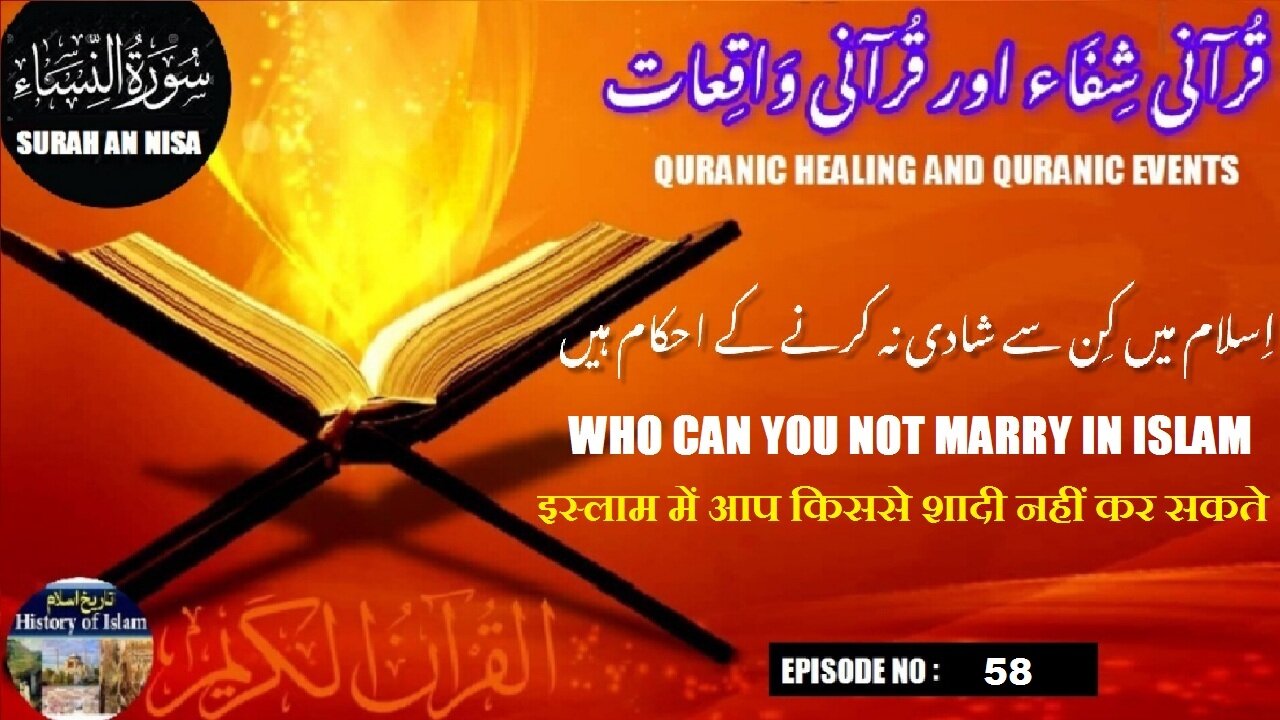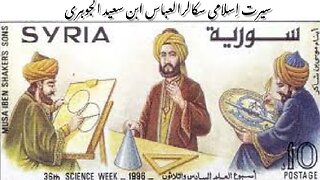Premium Only Content

Who can't you marry in Islam इस्लाम में आप किससे शादी नहीं कर सकते اسلام میں کن سے شادی نہیں کر سکتے
@islamichistory813 #quranic #marriage #and #family #laws #understanding #the #prohibited #categories #in #marriage #healing #and #events #from #the #quran #historical #stories #and #events #quranicstories #selfhealing #success #stories #striking #events #in #history #quranstories, #storiesfromthequran #religious #creation #stories #trending #quran #short #historical #loves #historical #heroes #what #is #true #strength #calm #quran #recitation #for #babies #islamic #healing
Who You Cannot Marry in Islam, Qur’an 4:22–24 Explained
Assalamu Alaikum, wa Rahmatullahi wa Barakatuhu.
Brothers, sisters, friends and elders, we are presenting the 58th episode of the Islamic informative video based on healing and events from the Holy Quran, and in this episode we will describe,Who You Cannot Marry in Islam, Qur’an 4:22–24 Explained
Quranic Marriage and Family Laws: Understanding the Prohibited Categories in Marriage (Surah 4:22–24)
The Qur’an provides a clear, comprehensive, and morally grounded framework for marriage and family life, aiming to establish a just, respectful, and stable society. A crucial aspect of this framework is the detailed guidance on whom one is prohibited from marrying, as outlined in Surah An-Nisa (4:22–24). These verses enumerate specific categories of women who are forbidden for Muslim men to marry, establishing boundaries that preserve familial integrity, protect human dignity, and prevent social corruption. These marriage prohibitions are not arbitrary; they are rooted in divine wisdom, reflecting deep concern for family sanctity, societal structure, and individual wellbeing.
Surah An-Nisa (4:22–24) begins by forbidding marriage to women who were previously married to one’s father. The verse states: “And do not marry those [women] whom your fathers married, except what has already occurred. Indeed, it was an immorality and hateful [to Allah] and was an evil way.” (4:22). This command puts an end to a pre-Islamic custom where sons would sometimes inherit their father’s wives as part of the estate. Islam condemns this practice as deeply immoral and establishes the principle that marriage must be based on respect, not ownership or inheritance. This prohibition reinforces the sanctity of familial roles, preserving the honor and dignity of women and preventing any confusion in family lineage.
The next verse (4:23) provides a detailed list of female relatives who are mahram — that is, permanently prohibited in marriage due to close blood ties, nursing (fosterage), or marital relations. These include: one’s mother, daughters, sisters, paternal and maternal aunts, nieces, foster mothers, foster sisters, mothers-in-law, stepdaughters under one’s care (if the marriage with their mother was consummated), and daughters-in-law. Additionally, a man is forbidden from marrying two sisters at the same time. This comprehensive list creates a protective structure around the family, ensuring emotional boundaries and preventing potential conflicts and emotional harm that could arise from inappropriate closeness.
By forbidding marriage to such close relatives, the Qur’an also upholds the psychological and moral well-being of the family. Each familial relationship has its own sanctity, and confusing these roles through inappropriate marriages would damage the fabric of trust and affection that healthy families require. These laws also serve a public health purpose, as modern genetics confirms the higher risk of hereditary diseases in children born from close consanguineous relationships — knowledge that was unknown to seventh-century Arabia but already addressed through divine legislation.
The Qur’an also extends the list of prohibited women in Surah 4:24, which addresses women who are already married. It says: “And [also prohibited to you are] married women, except those your right hands possess.” This means that a married woman cannot marry another man until her marriage is lawfully dissolved — either through divorce or the death of her husband. The exception “those your right hands possess” refers to women who were captured in war and whose previous marriages were annulled by captivity, a context-specific ruling in early Islamic history, not a license for exploitation. This reinforces that the default rule is respect for the marital bond and that marriage can only exist between free, consenting individuals under lawful circumstances.
These prohibitions are not limited to men only. While the Qur’an lists the forbidden women for men explicitly, the same categories apply in reverse to women in Islamic law. Muslim scholars have derived a parallel list of men forbidden for Muslim women to marry, including fathers, sons, brothers, uncles, nephews, foster fathers, foster brothers, and sons-in-law, ensuring gender parity in the restrictions on marriage.
It is also important to note that these prohibitions are not intended to limit or burden believers unnecessarily but to protect them from harm, ensure healthy relationships, and uphold the family as a moral and spiritual unit. The Qur’an repeatedly emphasizes that these laws are part of Allah’s wisdom and are meant for the benefit of humanity. The clarity of the prohibitions ensures that there is no confusion in matters as sensitive as marriage, and it encourages Muslims to seek lawful and respectful unions.
In conclusion, the Qur’anic marriage and family laws concerning prohibited women to marry, as outlined in Surah An-Nisa (4:22–24), are a cornerstone of Islamic family ethics. These verses establish clear boundaries based on blood relations, foster ties, and existing marital status. They protect the family structure, maintain lineage clarity, and honor the dignity of all individuals involved. These divine guidelines reflect the Qur’an’s overarching commitment to justice, morality, and social harmony — principles essential for building strong, compassionate families and, ultimately, a healthy society.
Prohibited women to Marry according to the Verses 22-24 Surah An-Nisa are Mothers, Sisters, Paternal and Maternal Aunts, Nieces, Foster Mothers, Foster Sisters, Stepdaughters, Two sisters simultaneously, Married Women and Stepdaughters under your care.
With this, we ask for your permission until tomorrow and pray to Allah Almighty to grant us the ability to act on the Quran and Hadith, Amen
Allah Hafiz
============================
-
 7:53
7:53
ISLAMIC HISTORY
12 hours agoBiography of Al-Abbas ibn Said al-Jawhari سیرت العباس بن سعید الجوہری
8 -
 2:08:38
2:08:38
TimcastIRL
5 hours agoNetflix Shares TANK, Elon Says BOYCOTT After Writer MOCKS Charlie Kirk Assassination
188K133 -
 LIVE
LIVE
SpartakusLIVE
6 hours agoI'M BACK || Quads w/ The Boys
703 watching -
 9:33
9:33
Ken LaCorte: Elephants in Rooms
9 hours ago $0.90 earnedWhy Do Black Men Love Big Butts?
12.8K5 -
 2:12
2:12
From Zero → Viral with AI
1 day ago $0.70 earned🚀 AI Marketing Isn’t Just for Big Brands Anymore — Here’s Why
17.8K8 -
 9:51:58
9:51:58
Dr Disrespect
13 hours ago🔴LIVE - DR DISRESPECT - 10 WINS ON CONTROLLER - BO7 TOMORROW
295K20 -
 1:24:56
1:24:56
Glenn Greenwald
7 hours agoTrump Declares Cities as the Enemies Within; Reagan Appointed Judge Slams Trump Over Speech Crackdowns; American ER Doctor on Gaza Atrocities | SYSTEM UPDATE #524
121K86 -
 LIVE
LIVE
I_Came_With_Fire_Podcast
13 hours agoPete Hegseth and the Chamber of Standards | Digital IDs | Taiwan Chips & Salsa | CDL Crisis
321 watching -
 2:01:46
2:01:46
Adam Does Movies
12 hours ago $0.26 earnedTalking Movies + Ask Me Anything - LIVE
14.9K -
 29:11
29:11
Nick Shirley
5 hours ago $2.62 earnedPortland has Fallen... ANTIFA Take Control of City
16.9K29